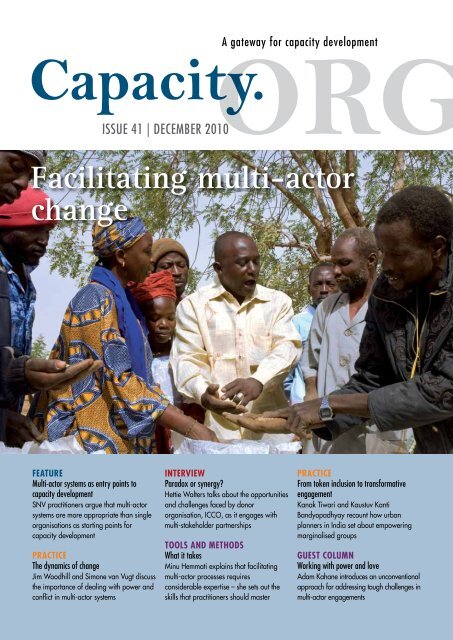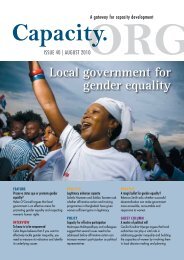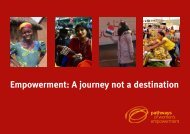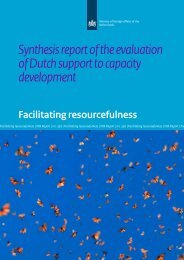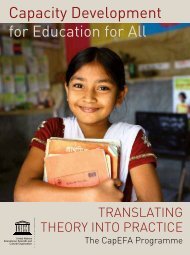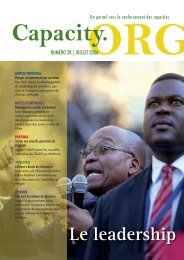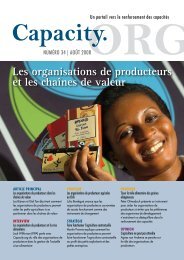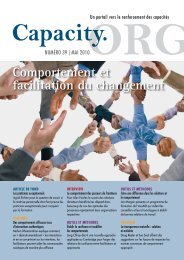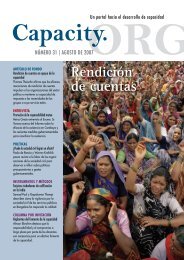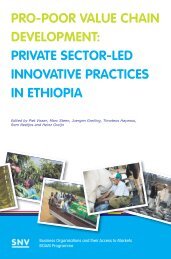Facilitating multi-actor change - Capacity.org
Facilitating multi-actor change - Capacity.org
Facilitating multi-actor change - Capacity.org
You also want an ePaper? Increase the reach of your titles
YUMPU automatically turns print PDFs into web optimized ePapers that Google loves.
FEATUREThe oilseed value chain – UgandaAn analysis of Uganda’s oilseed sub-sector in 2006revealed that there was great potential for growthin terms of productivity, income and employment.However, it was apparent that growth was stifled bypoor coordination, and lack of collaboration andinformation sharing between <strong>actor</strong>s. As a result, thesupply of inputs was inadequate, bulk purchasingwas a rarity, post-harvest handling facilities andtechnologies were inadequate, <strong>actor</strong>s lacked accessto finance, and sub-sector policies and regulationswere weak.When confronted with this analysis, the valuechain (VC) <strong>actor</strong>s decided to jointly tackle theconstraints in the value chain. One national andfour regional <strong>multi</strong>-stakeholder platforms (MSPs)were established comprising all relevant <strong>actor</strong>sin the VC including primary <strong>actor</strong>s (producers,input suppliers, researchers, processors, sectorassociations, warehouse owners and transporters);service providers (financial institutions, higherinstitutions of learning, business-developmentservices); and government and key donor agencies.SolutionsThe platforms have produced a number of solutions.The national platform contacted Uganda’s largestprocessor and seed importer, Mukwano Industries,who agreed to import enough hybrid seed for allthe farmers in the sub-sector. They also negotiated afunding guarantee scheme through the AgriculturalSector Programme Support, a project run by theDanish International Development AssistanceAgency.This enabled the agro-input dealers’ association,UNADA, to distribute Mukwano’s seed using itsown nationwide input distribution network. Theplatform used the funding scheme to negotiatean agricultural loan guarantee with StanbicCommercial Bank. This scheme offered a 50%donor guarantee to all oilseed farmers taking outloans to buy ploughing implements. Some 50,000oilseed producers benefitted from this scheme.This requires considerable knowledge andappreciation of the sectoral context on theone hand and advisory and facilitation skillson the other. Whenever there was a directtechnical contribution, stakeholders werealways assured that the external advisorwould not take control or determine theagenda.What the cases do not describe in detail isthat in improving relations one has to dealwith interests, power and conflict. Often<strong>actor</strong>s do not trust each other very muchand a blame game may be going on. But thecases do show a highly practical and resultsorientedapproach to facilitation in suchpotentially difficult settings. On closerscrutiny, we can see a range of elements:• Brokering new contacts• Brokering information and knowledge tounderstand context• Hosting, chairing or facilitating meetings,trips, visits, etc.As a result of the policy dialogue <strong>org</strong>anised bythe platform, the Ugandan government introduceda guarantee scheme through commercial banks tomake it easier for farmers to access financing. Later,they introduced a warehouse receipts system in theoilseed-producing areas closer to the farmers. Muchof the information – especially on prices, sectortrends and production systems – was generatedfrom work on the rural information system.ResultsThe impact in terms of productivity, income andemployment was impressive. In three years, thenumber of households engaged in oilseed farmingincreased from about 150,000 to 500,000. Now,70% of oilseed-producing households have accessto hybrid, high-quality seed; yields have increasedfrom 600 kg-per-acre to 1000 kg-per-acre; farmgate prices for raw materials have increased fromabout 400 USh/kg to 850 USh/kg; and the numberof processors has increased from four to 34.TrustAt the root of this success is the <strong>change</strong> inrelationships. Actors who previously did nottrust each other and worked independently, nowrecognise that they all belong to one system. Theyhave set up collaborative relationships and jointstrategies to develop the VC. They have developedthe ability to think beyond specific <strong>actor</strong> interestsand focus on systemic issues to develop jointpositions and solutions.Solutions posed at regional MSPs haveinfluenced national policy decisions, ratherthan policy decisions being pushed down fromthe top. This has contributed to a favourableenvironment for producers to strengthen their<strong>org</strong>anisations and speak with a strong collectivevoice at platform discussions where they can nowarticulate their challenges and negotiate betterterms and conditions. The <strong>multi</strong>-stakeholder processthus served as a basis for the empowerment ofproducers and improved the engagement of other<strong>actor</strong>s at the same time.• <strong>Facilitating</strong> negotiation and deal-makingbetween <strong>actor</strong>s• Participating in innovation between<strong>actor</strong>s, ‘cultivating’ their commitment• Giving individual advice or coaching to<strong>actor</strong>s to strengthen their roles/capacities• Mediating in conflicts or difficultsituations• <strong>Facilitating</strong> <strong>multi</strong>-stakeholder processes orplatforms that extend over time• Being an administrative agent forfinancial arrangements between <strong>actor</strong>s• Promoting issues or perspectives thatothers can not take onNote the significant shift from ‘expert’ rolesto ‘facilitation’ roles – facilitation that isvery results-oriented and requires adequatesector knowledge. Kenyan advisor, ThomasWere, one of the co-authors of this article,explains: ‘As a capacity developmentspecialist in the livestock sector, I used toprovide fairly standard training andworkshops for NGOs, farmers’ <strong>org</strong>anisationsand governments. Now we engage with the<strong>multi</strong>-<strong>actor</strong> chain as a whole and I need toknow more to be able to point my clients todynamics, opportunities and contacts. So Ineed to be very familiar with thehappenings in the sector. At the same time, Icannot prescribe what should be done, and Ihave to be more responsive and skilled infacilitation than I was before. The <strong>actor</strong>sdetermine what is interesting and feasibleand can usually do so much better thanexternal players.’What Were is describing is the role of atrusted broker who decreases the levels ofrisk for <strong>actor</strong>s to engage and who helpsthem to do things that they did not considerfeasible before. During a recent conversationabout these and other cases, an observationwas made that a trusted advisor or broker is‘like an intelligent friend’. Such friends areresponsive to your situation and needs. Theyhave a fresh view and help to understandthe situation from various angles. They arerespectful and understanding, straight andhonest. And they are independent and donot try to please you or serve particularinterests. With such quality of support, thatelusive substance, ‘trust’ starts to become aconcrete reality.Conclusions and perspectivesThis leads us to three types of conclusions:conceptual and methodological insights;clues about how to improve theeffectiveness of development support; andprofessional challenges.From a conceptual and methodologicalperspective the findings point to:• An evolution in CD thinking and practicethat moves away from training and<strong>org</strong>anisational development towardsfostering the effectiveness of <strong>multi</strong>-<strong>actor</strong>systems• The recognition that capacity is highlyrelational and that many forms ofeffective capacity grow in the interactivespaces between <strong>actor</strong>s• The notion of ‘action CD’ that focuses noton capacity inputs but on supporting the<strong>change</strong> process led and carried out bylocal <strong>actor</strong>s with capacity developmentsupport woven into the process• The importance of a ‘trusted broker’ inimproving <strong>multi</strong>-<strong>actor</strong> dynamics and therelated understanding of a range offacilitating elements that can help<strong>multi</strong>-<strong>actor</strong> systems to gain newdynamics and levels of performanceFrom a perspective of ‘aid effectiveness’, itis relevant to note that all the cases in thisarticle show that fundamental <strong>change</strong>s inthe way <strong>actor</strong>s related to each otherresulted in systems functioning better thanbefore. This was evidenced by higherlevels of production, income andemployment. These cases illustrate howeffective <strong>change</strong> is created by and betweenlocal <strong>actor</strong>s and not simply through policyimplementation.6 <strong>Capacity</strong>.<strong>org</strong> Issue 41 | December 2010
Alamy / Michael RunkelTraditional beehive, EthiopiaBoosting the honey trade – EthiopiaIn 2005, Ethiopian beekeepers were producingjust small quantities of high-quality table honey.Most of what they produced was of a standardquality and destined for sale locally to be used intej, the traditional Ethiopian honey wine. Five yearslater, 27,000 producers managed to increase theproduction of high-quality honey resulting in anincrease of average household income by US$150.Now, ten honey processors are providing 400tonnes of honey annually for the export market.How did this <strong>change</strong> happen? Although asimple story in itself, the reality is a complex oneof facilitating immediate opportunities, stimulatinginnovation, building on or unlocking existinginitiatives, using flexible funding and providingservices.The story started at the 29 th Apimondia tradefair in Dublin, Ireland, in 2005 when Haile Gi<strong>org</strong>isDemissie, the enterprising director of Beza Marhoney processors recognised that there was a hugeexport market for Ethiopian honey. But he alsorealised that bringing honey to the internationalmarket was not something he could do alone.The spark of an ideaBack in Addis Ababa, he presented his ideas to a<strong>multi</strong>-stakeholder workshop <strong>org</strong>anised by SNV. Abasic value-chain analysis was carried out and thespark of his idea ignited enough interest amongthe participants to form a coordination group (CG)headed by Demissie. Over time, the CG has beenjoined by processors, exporters, newly establishedproducer associations, apex <strong>org</strong>anisations,certification and auditing service providers,financial institutions, government ministries, andresearch and educational institutions.The CG looked at ways of entering the EUmarket and addressed the issues of how to qualifyfor export licences and how to orchestrate sufficientvolumes of honey to fulfil overseas orders. SNV’srole was to bring the stakeholders together.Consultants were hired to advise on issues whereSNV and value-chain <strong>actor</strong>s had no expertise. Forexample, SNV assisted in liaising with a laboratoryin Uganda to use their facilities, and the Ministryof Agriculture helped exporters to acquire EUaccreditation for Ethiopian honey.A business perspectiveThe next step was the formulation of a StrategicIntervention Plan. This focused on three main areas:establishing export contacts, boosting processingcapacity and qualifying for certification. As thisrequired increasing the production of specificgrades of honey, f<strong>org</strong>ing stronger business linksbetween processors and producers was vital. Theselinks helped both parties by assuring a consistentsupply of honey for the processors and reliablemarket outlets for the beekeepers.In order to create these new links, levels of trusthad to be increased and relational risks reduced.New technologies also needed to be taken onboard, the service delivery had to be improvedin almost every area, and new ways had to befound for accessing finance and other inputs. Forexample ‘transitional beehives’, developed by anentrepreneurial farmer and improved by Holeta BeeResearch Centre, were tested for appropriatenessand affordability for Ethiopian beekeepers,specifically women beekeepers, and scaled-up withthe help of processors.All this activity resulted in the establishment ofthe Ethiopian Apiculture Board as a public-privatepartnership incorporating the CG and steeringfurther sector development.Transfer of expertiseSNV’s role was to facilitate the <strong>change</strong> process,especially through establishing business links,supporting planning, smoothing access to grantsand investment capital, and moderating the CG. Byengaging an Ethiopian CD firm, SNV transferred valuechain facilitation skills to a local <strong>actor</strong>. In the course ofthis process, SNV’s role <strong>change</strong>d to ‘value chain coach’for business innovations and CD services, and forreplication to other sectors and programmes.This suggests that action CD should be atcentre stage when we are rethinking the roleof capacity development in policy andpractice. Such action CD is based on threekey principles: <strong>multi</strong>-<strong>actor</strong> engagement; thematching of financial support with localresources, dynamics and ingenuity; andsupport that is responsive and flexible to thelocal <strong>change</strong> process. These present clearchallenges for many sector programmes.There is convincing evidence that<strong>multi</strong>-<strong>actor</strong> approaches have something quiteimportant to offer. But it needs furtherexploration as a professional domain. Someimportant professional challenges are:• Deepening the understanding of the rangeand variation of <strong>multi</strong>-<strong>actor</strong> processes,spaces, platforms and mechanisms, andexploring their relevance for varioussituations and purposes• Looking at the practices and principlesthat help sustain productive <strong>multi</strong>-<strong>actor</strong>spaces and dynamics; and doing thiswithout over-institutionalising them ormaking them overly formal• Exploring innovative financing andsupport strategies for <strong>multi</strong>-<strong>actor</strong> system<strong>change</strong> (see also the interview with HettieWalters on page 9)• Expanding the professional repertoire offacilitating and brokering <strong>multi</strong>-<strong>actor</strong>dynamics• Fostering learning opportunities forprofessionals in advanced <strong>change</strong>facilitation, especially for in-country andinternational capacity builders.Overall our central conclusion is:effectiveness is created ‘on the shop floor’and spreads most effectively throughbottom-up and horizontal links rather thanbeing imposed from the top. <strong>Capacity</strong> cannotbe taught. Rather it evolves from helping<strong>actor</strong>s to deal jointly with real-lifechallenges. So working consciously, ordeliberately, with <strong>multi</strong>-<strong>actor</strong> systems is anessential evolution. The concept of action CDhelps to shift away from a supply-pushapproach to responsive support. Workingwith <strong>multi</strong>-<strong>actor</strong> systems not onlycomplements and incorporates earliertraining and <strong>org</strong>anisational developmentapproaches, it also has the potential toaddress development challenges moreeffectively and to create more self-sustainingforms of capacity.
PRACTICEDealing with power – the key to successful MSPs?The dynamics of <strong>change</strong>Jim WoodhillJim.Woodhill@wur.nlDirector Wageningen UR Centre for DevelopmentInnovation (CDI), the NetherlandsSimone van Vugtsimone.vanvugt@wur.nlInnovation and Change Programme Leader CDIFor over ten years, Wageningen UR Centre for DevelopmentInnovation (CDI) has been offering capacity developmentprogrammes to support the practitioners of <strong>multi</strong>-stakeholderprocesses (MSPs). One of the most important functions ofthese programmes is to prepare facilitators to work withpower and conflict in order to bring about successfuloutcomes.Politics and power are at the heart of anyeffective MSP. After all, powerdifferences are often at the root of economicand social inequality, unsustainable resourceuse and conflict. Not recognising this, orignoring its implications, can pose seriousrisks to the process. MSPs can be powerfuldrivers of <strong>change</strong> but if practitioners do notunderstand the power dynamics betweenstakeholders, they can undermine the processor even make things worse. We should alsobear in mind that development practitionersand <strong>org</strong>anisations are not ‘neutral’ in MSPs;they bring their own power and politicalinterests to the table.complexity of human systems. CDI’sframework consists of:1) The rationale – which explains why, in anincreasingly complex world, MSPs arebecoming an important governancemechanism2) The seven principles – which deal with thedynamics of transformative <strong>change</strong> (theseinclude recognising issues around powerand conflict)3) The practice – which shows how a widerange of participatory methods and toolsare combined with facilitationcompetencies to enable effective <strong>change</strong>processes(More detail on this framework can be foundin the online version of this edition of<strong>Capacity</strong>.Org)Shifting powerA significant shift in power relations is oftenrequired in order to bring about <strong>change</strong> andtackle the underlying issues that have led toan MSP being set up. For example, it may benecessary to empower less-influentialstakeholder groups and individuals. Often, itis only when marginalised groups exertpower that those who call the shots see theneed to engage.Two sides of the same coinLet’s be clear – power is positive. It is whatenables any human endeavour to succeed.However, power can also be used to maintainprivileged positions, protect discriminatoryinterests and preserve the status quo. InMSPs, individuals and groups have verydifferent types and levels of power in the<strong>multi</strong>ple relationships at play.How power dynamics are dealt withsignificantly influences the trust, opennessand overall legitimacy of the process.Conflict and anger often emerge whenindividuals or groups feel overpowered byothers and sense that their issues andconcerns are not being fairly treated.As a practitioner, it is not alwaysnecessary, or desirable, to tackle power andconflict head on. Handling power in a waythat can contribute to constructivestakeholder engagement requires a good dealof wisdom on the part of leaders andfacilitators.Designing and facilitatingCDI has developed a framework to help MSPpractitioners to design and facilitate aprocess that is unique to the demands oftheir specific situation. Central to this is anunderstanding of the issues of power andconflict within a wider context ofgovernance, and an appreciation of theRationaleGoverning for sustainabilityand equityin a complex worldPracticeMethods, tools and tipsfor process designand facilitationPrinciplesThe dynamics oftransformative <strong>change</strong>8 <strong>Capacity</strong>.<strong>org</strong> Issue 41 | December 2010
There are many different types of powerand ways of looking at it from theperspective of MSPs.• Authoritative – the authority given to ortaken by a particular individual or group;for example, governments, legal systems,managers and social group leaders• Economic – the access to and control overfinancial and material resources• Coercive – the use of physical violence orpsychological manipulation to controlwhat others do• Knowledge – having privileged access toor control of knowledge, information andexpertise• Ideological – the use of ideas, culture,religion and language to shape the waypeople see their world and behave• Charismatic – the ability of individuals touse the power of their personalities to gaina following and exert influenceTo engage with shifting power, practitionersneed to:• Understand the dynamics of power at play• Work with less-powerful groups to helpthem identify concerns and issues clearly• Actively support the capacity developmentof some groups by facilitating access toresources• Build trust and understanding betweengroups so that the more powerful becomesupportive of others• Stop or <strong>change</strong> processes wheremarginalised groups are being furtherdisempowered• Facilitate processes in a way that ensuresall groups can contribute in an equitablewayNGOs in particular face difficult choicesabout the roles they will have in MSPs. Dothey try to be the honest broker and take onthe role of coordinating and facilitating theprocess? Do they decide that the interests oftheir constituencies are better served if theydevelop the power bases of particular sets of<strong>actor</strong>s to allow them to have more influencein the process?Both are important and legitimate rolesbut it is difficult for one <strong>org</strong>anisation to beeffective at both. Sometimes, decisions haveto be made about whether to support apartisan process of empowerment or take ona more neutral, stewardship function.As we can see in the palm oil example (see‘Palm Oil Story’ box), some groups opting fora more confrontational approach can bewhat precipitates <strong>multi</strong>-stakeholderengagement.Dealing with conflictFor an MSP to be effective in dealing withconflict there must be a high level of commoninterest. This is what makes it worthwhile forthe parties to try and overcome theirdifferences. If this does not exist, MSPs arenot an effective mechanism.Some MSPs are set up specifically to dealwith conflict; for example, as part ofHarvest at an oil palm plantation in South Sulawesi, IndonesiaThe Palm Oil StoryNearly 40% of all vegetable oil traded worldwideis palm oil. It is widely used in food, cosmetics,industry and as a biofuel. Already the world’sdominant oil, demand is set to grow dramaticallyover the coming years, especially from China andIndia.Most palm oil is produced in tropical areasusing land that was once rainforest. The ecologicalimplications of this are significant, and there arealso severe negative consequences for local andindigenous communities.This is a <strong>multi</strong>-stakeholder issue that is fraughtwith power and conflict issues from local level rightthrough to global level. In response to widespreadconcern and international campaigns, a groupof NGOs and palm oil companies formed theRoundtable on Sustainable Palm Oil (RSPO). Thisinitiative was relatively successful, yet unsustainableand socially inequitable practices continued.A coalition of local NGOs in Indonesia prevailedupon the World Bank Group to put a moratoriumon any further investment in palm oil projects untilthe situation could be properly addressed by aglobal <strong>multi</strong>-stakeholder consultation process. Thisprocess was able to bring the conflicting parties toround-table dialogues.The motivation behind the global consultationprocess was not to simply solve the conflict.Rather, it provided the World Bank Group withthe views of all the stakeholders involved so thatfuture investments could be made in a way thatwould ensure sustainable and equitable practices.Much emphasis was put on the need for betterengagement and conflict resolution processesbetween companies and local people.From a power and conflict perspective, thepalm oil story can give us a number of interestinginsights. First, the MSPs took place against abackground of significant conflict – local conflict,international conflict and corporate conflict. Thepotential of these conflicts to have a negativeimpact on the brand images of companies involvedin palm oil production and processing was oneof the f<strong>actor</strong>s that spurred the <strong>multi</strong>-stakeholderengagement into existence.The second insight we can gain from the palmoil story is that a ‘good cop, bad cop’ strategy wastaking place successfully with some NGOs optingfor a campaigning role and others supporting<strong>multi</strong>-stakeholder engagement.Third, we can see the different sources of conflictvery clearly. There are value differences aboutwhat constitutes well-being for local communities –economic growth or the preservation of traditionallifestyles and the environment. In the face of poorspatial planning and monitoring, there are majordisputes over the ‘facts’ of the situation: exactlywhat impact is the production of palm oil having onthe environment?Fourth, we can see that conflict and powerdynamics are leading to new forms of governance.Standards of sustainability are being developedand implemented not by government, but throughthe power of global NGOs and agri-foodbusinesses. Not all governments are happy with thisdevelopment.It is clear that a variety of <strong>multi</strong>-stakeholderprocesses will continue to have an increasingimportant role in finding ways of meeting theworlds demand for palm oil ... sustainably andequitably.Reuters / Yusuf Ahmadwww.capacity.<strong>org</strong> 9
PRACTICEpeace-building efforts in the wake of armedviolence, or to overcome conflict over theuse of natural resources. In these situations awell-thought-out conflict transformationapproach is a key part of the MSP. In othersituations, such as the development of valuechains or the provision of health services,conflict resolution will not be the mainreason for setting up the MSP, yet conflictwill often emerge as the process unfolds.MSPs are full of minor conflicts such astensions between personalities, irritationsover communication styles, frustrations withprogress – and the normal dynamics anygroups goes through as its members learn towork together. When these minor conflictsare dealt with well, they can be the source ofbetter understanding and greater trust. Ifthey are not handled well, they can easilyescalate to a point where they can dash anyprospect of the MSP being effective.It is critical to try and understand theunderlying causes of conflict. Is it caused by:• Differences of opinion over data or facts, ordisputes over the validity of information?• Relationship conflicts or personalitydifferences?• Competing needs and interests over accessresources?• Issues related to laws, roles andresponsibilities or historical differences?• Differing cultural or political beliefs andvalues?Often conflict is the result of a complex mixof these causes. For example, havingdifferent cultural or political values may leadpeople to see data or facts in very differentways.When dealing with conflict:• Watch out for contention below thesurface• Analyse the underlying causes of conflicts.• Assess the feasibility of MSPs, given thetype and degree of conflict• Bring groups through the phases of‘forming, storming, norming andperforming’• Help stakeholders to remove the dimensionof personality when addressing problems;to focus on interests rather than fixedpositions; to explore <strong>multi</strong>ple options forresolution and to establish criteria for fairdecision making• Try to understand which stakeholders willhelp overcome conflict and which willexacerbate it• Work on conflict issues behind the scenesto help make <strong>multi</strong>-stakeholder events asconstructive as possibleThe way that MSPs are designed andfacilitated dictates how constructively theywill handle conflict. For example, peopleshould be given time to get to know eachother and build up trust before trying totackle substantial and contentious issues.It is particularly important to useapproaches that enable stakeholders to findhigh levels of common interest. This willmotivate them to put differences aside andwork on a common agenda.There are many facilitation techniquesthat help people to put themselves in ‘theshoes of others’. At the end of the day,dealing with conflict requires dealing withemotions; so it is important to find ways thatenable people to express their own feelingsand connect with the feelings of others.
Multi-stakeholder partnerships as a donor strategyParadox or synergy?interviewThe Interchurch Organisation for Development Cooperation(ICCO) is a Dutch donor agency engaged in facilitating andfunding <strong>multi</strong>-stakeholder partnerships. Its unique approachhas been adopted by five other <strong>org</strong>anisations in the ICCOAlliance.Hettie Waltershettie.walters@icco.nlCoordinator, capacity development, ICCO, Utrecht,the NetherlandsHettie Walters is ICCO’s capacitydevelopment (CD) coordinator. Shepromotes learning alliances and knowledgedevelopment, specifically in relation toICCO’s programmatic approach and to CD. Inan interview with <strong>Capacity</strong>.<strong>org</strong>, Hettieexplains how this approach can be applied to<strong>multi</strong>-stakeholder partnerships (MSPs).Hettie, why does ICCO engage infacilitating MSPs?As a donor agency, our focus for many yearsnow has been on matters relating to, amongother issues, accessing basic services, financialservices, international and local markets,democratisation and conflict transformation.We have learned that we cannot addressthese issues by giving support to single<strong>org</strong>anisations. In order to bring about whatwe call ‘systemic <strong>change</strong> at the institutionallevel’, it’s necessary for <strong>multi</strong>ple <strong>actor</strong>s tobecome involved. That’s why over the lastfour years our programmatic approach hasgradually moved towards mobilising <strong>multi</strong>ple<strong>actor</strong>s to collaborate and bring about <strong>change</strong>.Learning to think in terms of systems is acore element of this approach. Systems canbe small and linked to a specific localproblem, or large enough to encompass awhole value chain. By systems we mean, forexample, the structures that create or limitAlamy / Jayne FincherChildren attending a school in Ladakh, Indiathe opportunities for children who live inremote mountain areas to attend school andreceive an education through their ownlanguage; or the structures that ensure thatmen are regarded as the heads of householdsand hold the titles to the land, while womenhave no property rights and cannot operateindependently in the marketplace.Another example of this sort of system isthe one that excludes young people fromeffective health care by preventing access toinformation on sexual and reproductivehealth and rights. In all these systems,families, community <strong>org</strong>anisations, NGOs,government agencies and the private sectortend to interact in a way that ensures thesystem stays as it is.Where does ICCO’s involvement with anMSP start?Our point of departure is usually the<strong>org</strong>anisation with which we already have afunding relationship. This is normally anNGO, a community-based <strong>org</strong>anisation or asocial movement. In this context, we bringtogether partners who have an interest inaddressing a specific problem. We jointlyanalyse the system and determine whichother <strong>actor</strong>s need to get involved in theprocess – <strong>actor</strong>s such as government orprivate-sector <strong>org</strong>anisations. We brainstormabout possible solutions, and identify acommon purpose focused on the <strong>change</strong>sthat we think the system needs.In the beginning, we noticed that effortsto widen the circle of <strong>actor</strong>s were met withsome resistance. Partners feared that theywould have to share funding with thenewcomers. As a donor <strong>org</strong>anisation, we arealways confronted with something of aparadox when striking a balance betweenfunding and facilitating MSPs.We deal with this by reassuring partnersthat the level of funding will not be affectedif other <strong>actor</strong>s come in. Funding andfacilitation are strictly separate channels andhandled by different people. For facilitation,we try to hire local consultants wheneverpossible. Also the facilitation cycle is differentfrom the funding cycle. It is shorter andfocused on getting the process started. Ourapproach also has an inbuilt exit strategy.As a donor, you are in a powerful position.How do you avoid exerting influence to theextent that it undermines local ownershipof the process?Well, you can call this the second paradox ofbeing a donor and a facilitator at the sametime. This has been one of the subjects ofour learning process since we first started toengage with MSPs. As donors, we need to beaware that MSPs do not necessarily need theinvolvement of ICCO or other externalagencies. We need to be sensitive to theexistence of endogenous MSP processes. Andwhen we find them, we should make surethey are nurtured – if this is necessary.When we become involved with an MSP– whether as a catalyst or in a nurturing role– we have to be careful not to impose ourprogramme implementation agenda. This is adelicate balance. it demands great skill onthe part of the facilitators. We are makingsteady progress in mastering these skills butI would not claim that we have arrivedwhere we want to be.We are still learning but I am confident thatwe can work in synergy with local <strong>actor</strong>s inan MSP and make an important contributionto <strong>change</strong> by empowering them.
tools and methodsCompetencies needed to design and facilitate MSPsWhat it takesMinu Hemmatiminu@minuhemmati.netIndependent advisor, London and BerlinMulti-stakeholder processes (MSPs) are playing anincreasingly important role in sustainable development.Designing and facilitating MSPs depends on a set of diversecompetencies.Multi-stakeholder processes (MSPs) areprocesses that aim to bring together allmajor stakeholders in a new form ofcommunication and decision finding (andpossibly decision making) on a particularissue. Multi-stakeholder approaches becamea ‘buzz’ term and the concept was promotedin a number of international processesincluding the UN Global Compact and theWorld Summit on Sustainable Development2002. Since then, donors have amplifiedtheir emphasis on public-private partnershipsand entrepreneurial <strong>multi</strong>-sector initiatives.Looking back, we can say that theexpectations of these partnerships may havebeen slightly naïve.We have learned – yet again – thatcommunication is challenging, even more sobetween different stakeholders and acrosscultures. Collaboration not only requirescommitment, but also entails genuine readinessfor <strong>change</strong>, which is quite rare. Creatinginnovative ‘win-win’ situations whereeverybody’s interests are integrated isextremely difficult, and where it is not possible,reaching a compromise can be verycumbersome. Another thing we have learned isthat MSPs take considerable time, effort andresources. Because of this, they need to becomepart of people’s job descriptions and keyperformance indicators in order to allow themto convene, lead, facilitate and participate. Weare also learning that even then, we cannotassume that people have everything it takes toproceed successfully.When we think about the competenciesneeded for designing and facilitating MSPs,many areas of knowledge, skills andexperiences come to mind. These belong to arange of disciplines and professions, andinclude cognitive, emotional and socialabilities. Many can be acquired throughreading and listening, and others largelydepend on practise and experience so thattogether they constitute a combination ofart, science, and skill.This <strong>multi</strong>-layered, epistemological mix isuncomfortable for some people, at leastinitially, as it can seem eclectic and lacking asolid and consistent theoretical base.However, this set of competencies isgrounded in values, principles and aconstantly growing body of experience.In practice, it is most important to findwhat works, and, in particular, what worksfor each of us as an individual processprofessional. The field is in constantdevelopment, and we need to continuouslylearn from our own experiences, from peers,networks, and from new research in order tofulfil our tasks successfully and responsibly.The following headings introduce some ofthe main competencies necessary fordesigning and facilitating successful MSPs.Understanding the contextWe often hear people debate about whetherfacilitators should be knowledgeable aboutthe issues at hand. If they are, they will haveopinions about the issues, and that cancreate challenges in terms of neutrality inthe process and being trusted by allstakeholders. However, I have not seen awell-designed and facilitated process wherethe facilitator was uninformed about thesystemic context that the MSP was operatingin. Process professionals should at least befamiliar with the main terms, the pros andcons of the problem; the key characteristicsof the relevant stakeholders, such as theirworldviews, interests and theories of <strong>change</strong>;and the main (power) dynamics in thesystem. The more knowledge we have, themore important it is to demonstrateneutrality by communicating transparentlyabout opinions and how we are keepingthem out of the process.Knowing and developing yourselfSelf-awareness is essential when operating ina <strong>multi</strong>-stakeholder environment, andfacilitation requires significant levels ofindividual development. Self-awarenessincludes awareness of one’s owncharacteristics and behavioural tendencies,particularly in dialogic situations. It takesaccount of your awareness of how othersreact to you and awareness of your ownassumptions, feelings and blind spots.Self-awareness also involves understandingthat we use ourselves as tools in the process– as tools of perception, diagnosis andintervention. Essentially, we are usingourselves to genuinely connect withparticipants, model authentic communicationand get to know individuals, groups andissues that sometimes deeply affect us.Facilitators often hold the process togetheremotionally by reaching out to each andevery one, showing friendliness, respect,confidence and good humour. As in other,similar professions such as training,teaching, coaching and therapy, the idea ofself-awareness and working with oneself asa tool is grounded in careful reflection,constant establishment and re-establishmentof boundaries and attentiveness to one’s ownlimitations and needs.Individual development is necessary inorder to exemplify the principles of theprocess and evoke trust and trustworthiness,authenticity, flexibility, honesty, goalorientation, a keen sense of justice andexcellent empathy from all participants.Process professionals should have developedthe ability to exercise dialogic corecompetencies such as voicing opinions,listening carefully, respecting the ‘other’ andsuspending judgement. Individualdevelopment also helps us to not be afraid ofconflict, crisis, protests or expressions ofdistrust, and enables us to turn these intoopportunities for reflection and creativeproblem solving.In my experience, these ratherpsychological aspects of the work often getoverlooked. Yet they are essential if MSPsare to succeed – and equally essential inprotecting process professionals fromexhaustion and burnout.Envisioning the processThis refers to the ability to imagine anddesign the whole of the MSP over time,embedded in the systemic context andsubject to dynamics from within and outsidethe system. Envisioning an MSP includes theability to consider whole systems as well associal groups, institutions and structures, theindividuals within them, and all interrelationsbetween such entities.Short- and long-term thinking andplanning, and the ability to communicateand encourage these is vital. Many processprofessionals work with one of the MSPlife-cycle models and they cultivate aprofound understanding of the dialogicapproach as a way to connect andcollaborate with individuals, groups and12 <strong>Capacity</strong>.<strong>org</strong> Issue 41 | December 2010
cultures. They move between differentperspectives and world views, exemplifyingrole taking, and understanding the benefits ofconversations that foster sharedunderstanding and allow new solutions to begenerated.Epistemology and theoretical knowledgeEveryone approaches the MSP from theperspective of what is true for them. But, noone, including the facilitator, can claim tohold ‘the truth’. This is a basicepistemological assumption that underpinsMSPs. Our viewpoints depend on ourposition and roles in society. Recognisingthat there are different ‘truths’, held bydifferent stakeholders, can help to buildcommitment to the process, and fosterrespect for one another – not necessarily forour respective opinions but for the fact thatopinions are indeed diverse.In an MSP, the challenge is how to respectevery stakeholder’s truths while creatingintegrated solutions. Facilitators are expectedto design a process towards that goal,proposing plans, methods and agendas.However, the facilitator’s ‘truth’ can, andwill, be questioned. In such cases, facilitatorsneed to be able to share the reasoningunderpinning the process design –explaining why, at times, meetings should beclosed, stakeholders should work in smallgroups first, separate task forces are needed,draft agreements should be discussed line byline, and so on.Models, methods, toolsThese are what we use to put ourunderstanding and design of an MSP intopractice. They include tools that allow quickstakeholder identification and analysis as wellas numerous meeting and documentationformats for different purposes. Facilitationliterature is full of creative ideas, conditionsand goals – and new ones are beingdeveloped all the time. For example, when theobjective is to promote understanding andtransform conflict, tools such as Open Spaceor World Café are particularly useful. Andwhen the aim is to explore future views,Future Search and Scenario Building areuseful instruments.Many process professionals do notemphasise monitoring and evaluation asmuch as they should – methods such asOutcome Mapping are very useful forplanning and monitoring, and engageparticipants in a continuous process ofobservation and meta-communication, whichin itself helps MSPs to succeed.Being able to identify appropriate tools isan essential skill. While individualpreferences and experiences play a role, weshould not limit ourselves to a small set ofmethods. Rather we should choose from thewide range of available methods – inconsultation with a core group ofstakeholders. On the basis that form followsfunction, purpose and desired outcomeshould guide our choice of tools, while theVillagers with their advisers explore the potential impacts of the Narmada dam in India on theirlivelihoodscontext and framework conditions willdictate what can be done.TeamworkAll the competencies described above arenecessary for designing and facilitatingsuccessful MSPs. But does one individualneed to hold all of them, or can a group ofpeople with a combination of thesecompetencies make a successful team? Bysharing tasks, people learn more intenselyfrom each other. I have often observed howstakeholders and experts pick up facilitationmethods and hone their skills during an MSPand by working with a process professional.Creating a core team consisting of thefacilitator, process conveners and mainstakeholders is a way of pooling necessarycompetencies, as well as creating sharedownership within an ‘MSP nucleus’. Creatingand working with such a team requiresanother crucial competency on the processprofessional’s side: the ability to act as partof a team. Facilitators who tend to view theirwork as some kind of magician’sperformance may have difficulties sharingtheir competencies freely and bringing theminto a mix of equally importantcompetencies from other members of theteam. Maybe there is a tinge of narcissism,maybe the desire to remain needed, andindeed paid. Neither is helpful in an MSPnucleus team, and this again highlights theimportance of self-awareness and individualdevelopment.Getting what it takesWhen working with MSPs, attending to thecompetencies described above is a matter ofprofessionalism and quality control. In myexperience, an understanding of theepistemological and theoretical underpinningof the work, along with self-awareness andself-development, are the competencies thatare least developed among the broad andvaried group of sustainable developmentprofessionals engaged in MSPs. Often, the‘big’ issues tend to dwarf the ‘small’ ones –staying on top of issues such as poverty orclimate <strong>change</strong> seems to demand moreattention than perfecting your observationskills in a dialogic setting, for example.Those working on the ‘outer world’challenges often do not easily relate to the‘inner world’ phenomena. Yet investing thetime and resources in all competencies isnecessary to achieve maximum effectivenessand sustain <strong>change</strong>. This also has a politicaldimension of ensuring that funders keepproviding resources for MSP design andfacilitation: only successful processes, andlong-term data about success f<strong>actor</strong>s, willspeak to this investment in the long run.Yet, opportunities for honing MSP-relatedcompetencies are rare. The goal is not tocreate a more homogenous group of processprofessionals – there is great diversity inMSP facilitation, and that is welcome as itspeaks to a very diverse range of people andcontexts. Supporting these professionals intheir learning and development, however, isan important investment.As we continue learning, researching andevaluating <strong>multi</strong>-stakeholder processes, Ifavour combining more traditional ways ofstudying with an action learning approach.Practitioners need courses and materials, andthey need peer groups and coaches that helpthem reflect, improve and develop further.
PRACTICEUrban planning in IndiaFrom token inclusion totransformative participationAlthough labelled ‘participatory’ many urban planningprocesses in India involve only select elite groups. This articleexplains what is required to achieve genuine participationinvolving all stakeholders, including the poor and themarginalised.Kanak Tiwarikanak@pria.<strong>org</strong>Programme Manager at PRIA Global PartnershipKaustuv Kanti Bandyopadhyaykaustuv@pria.<strong>org</strong>Director of PRIA Global PartnershipIndian cities are chaos personified - vastheterogeneous conurbations whereindividuals and groups represent all shades ofeconomic, social, religious, cultural andprofessional identities. The fast pace ofurbanisation often leads to impromptu andthoughtless expansion, with littleconsideration given to basic services such aswater, sanitation and roads. Inclusive andparticipative city planning can be challengingto achieve; but it offers an ideal opportunityto implement processes that make planningresponsive to the needs of <strong>multi</strong>plestakeholders, with particular focus on poorand marginalised members of society.Embedding citizen participation in cityplanning is problematic because of the sheerscale of cities, the wide gaps in knowledgeand power between stakeholders, the lack oftechnical expertise and the prevalence ofpolitical patronage that favours elites.Traditionally, expert-driven planningprocesses have been so entrenched that therewas hardly any space for the poor andmarginalised to participate. In addition, thelack of updated data, weak local governmentsand political resistance to participatoryprocesses has widened the schism betweencitizens and city plans.Recently, the idea of participatory planninghas become rather fashionable. Projects led byboth government and private developers useterms such as ‘stakeholder consultation’ and‘people-friendly plan’ in their project briefs.But the reality of participatory planning isthat it tends to be limited to meetings with afew elite groups, where city issues arediscussed – and then the professionals takethe decisions on any future development.Sadly, such tokenism means that people’scontrol over decision making remains elusive.This will continue to be the case as long asprofessionals involved in the project receiveno training for facilitating meaningfulparticipation in highly fragmented societies,and as long as <strong>multi</strong>ple stakeholders andinterest groups including women, children,youth, the elderly and other marginalisedpeople are excluded from consultations.The greatest need is to facilitate citizens’involvement in the planning of their citiesand localities, and to transform theircontribution from mere nominal orconsultative participation into instrumentaland transformative participation.The Society for Participatory Research inAsia (PRIA) is one of the very few civilsociety <strong>org</strong>anisations in India that takes adifferent approach to city planning. Over thecourse of the past twelve years, we haveattempted to transform rigid planningprocesses into processes that are more peoplefriendly, flexible and inclusive. In this articlewe will share the lessons we have learned.More specifically, we will describe theexperiences we had preparing participatorycity development plans for two small townsand how we helped institutionalise socialaccountability mechanisms in five cities– four of which are state capitals.For PRIA, it is a given that urban planningis a participatory process. Staff are trained toreinforce this perspective in the way theyengage with the elected representatives. Whenpreparing the participatory developmentplans, PRIA held workshops for stakeholdersto help clarify the political and developmentalimportance of the planning process.Discussions held after the workshopsreinforced the view that the councillors andthe citizens together are the initiators andowners of the planning process.After the workshops and preliminarydiscussions, PRIA <strong>org</strong>anised citywidecampaigns to ensure that as many people aspossible knew about the development plans.This was an essential step in creating anenabling environment for a <strong>multi</strong>-stakeholderprocess to succeed. It meant clarifyinginformation that was often skewed, sensitisingthe ‘upper classes’ to the negativeconsequences of perpetuating existinginequalities and giving confidence tomarginalised groups and individuals.The next stage was to jointly analyse thecurrent situation to see what <strong>change</strong>s neededto be made to achieve the desired result. Allthe stakeholders contributed to this. However,it was necessary to limit the influence of someof the professional groups such as localacademic institutions, media groups, andvarious professional and businessassociations. Such stakeholders can contributeenormously to making the planning processan open and transparent ‘public deliberation’,but they need to modify their expectations toensure that the poor and marginalised canstill lead the process, or at least participate ina meaningful way.The PRIA facilitators then collated all theinformation, presented it to the stakeholders,and asked for validation and feedback.Everyone’s comments were incorporated andthe final plan was prepared and submitted tothe municipality. From that point onwards itwas mainly up to the municipality tomaintain the momentum and commitmentsof the various stakeholders. However, giventhe current resource-starved nature of localgovernments in India, it may not be possiblefor institutions to implement the plans intheir totality.The lessons we learnedThe demand and supply side ofaccountabilityParticipation requires a two-way processbetween citizens who demand accountability,better services and a defining role in decisionmaking, and a local government thatacknowledges the equal importance of allstakeholders and responds appropriately andtransparently. Facilitators must placethemselves as an interface between the14 <strong>Capacity</strong>.<strong>org</strong> Issue 41 | December 2010
‘supply’ and ‘demand’ sides of the process.(This is easier said than done, particularlywhen the facilitator is a pro-poor, civil society<strong>actor</strong> aware of skewed power relationshipsthat favour elitist governance structures.)In earlier projects, citizens had beenencouraged to participate but it was soonclear that amplifying the voice of the citizenswould have little effect if nobody waslistening. Learning this helped us to bridgethe rift between supply and demand. A veryinteresting example of this was support forthe creation of systems to redress grievancesin some municipalities. The citizens wereencouraged to flood the municipality withservice-related complaints. Simultaneously,the municipal officials and electedrepresentatives were sensitised and given thecapacity to respond by making strategic<strong>change</strong>s in their complaints systems. Even themost advanced complaints redressal systemsbecome defunct if citizens do not use them,while municipalities would never realise theimportance of social accountabilitymechanisms unless there was a demand.The importance of inclusivenessEnhancing capacity and promotingknowledge ex<strong>change</strong> are crucial. Facilitatorsmust be present on site throughout the courseof the intervention and they must f<strong>org</strong>erelationships with local civil society groupsand citizens’ <strong>org</strong>anisations. The ex<strong>change</strong> ofknowledge allows local people to give theirperspectives on issues related to the socioeconomic,cultural and planning aspects ofthe city. Facilitators must make sure that theyinform the citizens and local partners aboutall relevant policies, schemes andentitlements, and that they present thetechnicalities of planning in an accessibleway using local languages. It is essential to beaware of and use existing social networkssuch as religious groups and neighbourhoodgroups, as well as professional associationssuch as colleges, trades associations andchambers of commerce to expand thestakeholder base to include the entire city.Then knowledge and ideas can really begenerated from different fields.Including womenWomen are the real agents of <strong>change</strong> becausethey are the best representatives of many ofthe silent and marginalised groups. Womenhave higher hopes that, with the help ofexternal support, their efforts could makethings better – and they tend to be free oflocal political allegiances. Instead of beinghighly critical, they <strong>org</strong>anise themselves andget things done. In the cities of Raipur andRanchi, women <strong>org</strong>anised themselves intoneighbourhood groups and demanded publictaps, toilets and dustbins – and they got them.However, this was not the case in thesmall towns we worked in, where womenwere reticent about coming out into thepublic domain. It took months before agender balance could be achieved incommunity meetings. In these cases, it wasWomen collect their daily water ration from a new community tap in Mumbai, Indiaimportant to emphasise that they shouldparticipate actively (merely being there wasnot enough) and recognise that they hadimportant issues to share. It was interestingto observe that while men contributed tophysical infrastructure issues, women, whenthey started speaking, shared insights intoissues such as the lack of higher educationinstitutes, which caused their children to goaway; or the absence of street lights, whichrestricted their mobility. They spoke too ofthe dearth of maternal care centres, and toldmany stories of women having their babieswhile travelling to distant clinics.Do not discard technical expertiseTechnical expertise that is on the side of thepoor and marginalised <strong>change</strong>s the powerequation. It is important that developmentprofessionals respect technical expertisebecause they expect technical experts to acceptthe necessity of participatory processes. It isimportant that architects, planners, urbandesigners and other experts interact directlywith the people. Certainly, there is a need toplace participatory planning in collegecurriculums, but it is even more important thatit is instilled into the psyches of the technicalexperts. A good illustration of this is the storyof a community that was demanding a waterpipeline in their area, but the municipality wasasking them to shift to another area if theywanted better services. It escalated into a hugemisunderstanding with the people in thecommunity feeling very mistrustful of the localgovernment. The problem arose because thesettlement was partially situated on hard rockthrough which water pipelines could not bedrilled. A planner and geologist intervened, acompromise solution was reached and in-situresettlement was carried out to make wateravailable for every family.Technical expertise can also be useful inassessing the priority of people’s needs andexplaining about the equitable distributionof limited resources. For example, peoplefrom better-off economic backgroundssometimes suggest planning ideas forAlamy / India imagesairports and shopping malls when their townstill lacks proper basic services such as waterand sanitation.Small achievementsSmall achievements sow the seeds of hugesuccesses. Getting a small tap installed orrehabilitating one slum settlement proves tothe people that efforts yield results. Suchvictories build trust and enthusiasm andencourage more people to participate. Theyalso enhance the quality of participationconsiderably once people realise that theirefforts can make a difference.Small successes are also important for thelocal governments to showcase theirwillingness to become responsive. This isespecially so in political environments wherethe devolution of resources and power arestill very much the gift of the higherechelons of government.Access to informationInformation and knowledge are power – andgiving the poor and marginalised access tothem leads to their empowerment. Historically,information about policies, planning standards,the provision of services and entitlements todevelopment resources was largely inaccessibleto the marginalised majority – and even whenit was made available, it was presented inincomprehensible language that rendered itinaccessible. One of the roles of facilitators isto decode such planning jargon, not only forthe common citizens but also for electedrepresentatives. Equipped with the rightinformation and analysis, people can start totake charge of interventions and producesustainable solutions.But if they are to move beyond pilotprojects to schemes with larger coverage andgreater impact, they must have the support ofnational and district governments; as onlygovernments can provide the huge resourcesneeded for the next step.
guest columnSolving our toughest problems – unconventionallyWorking with power and loveFiona MuirheadAdam Kahanekahane@reospartners.comPartner in Reos Partners and associate fellowat the University of Oxford, UK.Conventional approaches to solvingproblems cannot deal effectively withincreasingly complex social crises. Our effortsto address ‘tough’ issues in this way oftencause us to become ever more confused,polarised and stuck.Why is this so, and what do we need to doto get ‘unstuck’?Social challenges can be complex in threedistinct ways. They can be dynamicallycomplex, meaning that cause and effect are farapart in space and time; dynamically simplesituations can be addressed piece by piece, butdynamically complex situations can only beaddressed systemically. They can be sociallycomplex, meaning that different stakeholdershave radically different understandings andinterests; socially simple situations can beaddressed by experts, but socially complexsituations can be addressed only by thestakeholders themselves. And they can begeneratively complex, meaning that they arefundamentally unfamiliar and unpredictable;generatively simple situations can beaddressed using past best practice, butgeneratively complex situations can only beaddressed by learning through doing.So when we try to address complexchallenges conventionally using approachesthat are piecemeal, authority-driven and basedon past experience, we inevitably get stuck. Tomove forward, we need to adoptunconventional approaches that are systemic,participative and emergent.Over the past 20 years, my colleagues and Ihave sought ways to develop and deploy suchunconventional approaches. We bring togetherbusiness, government and civil society leaderswho have been working separately to addresstough challenges in their complex socialsystems, but who have been unable to findsolutions alone. With our help, such <strong>multi</strong>stakeholderleadership teams learn to worktogether to construct a shared understandingof their current reality – and of what’s neededto <strong>change</strong> it. We then help them to prototype,pilot and institutionalise a new reality.Irreconcilable human drives?One of the most important lessons I havelearned, working on many challenges and inmany countries, is that leading such systemic,participative, emergent <strong>change</strong> processesrequires us to be able to work simultaneouslywith two fundamental human drives that areusually thought of as irreconcilable: powerand love. Here I am using Paul Tillich’sdefinitions of power as ‘the drive of everythingliving to realise itself, with increasing intensityand extensity’ and love as ‘the drive towardsthe unity of the separated.’ The essentialdynamics that underlie <strong>multi</strong>-stakeholdersocial <strong>change</strong> processes arise from theinterplay of these two drives – at the levels ofindividuals, groups, and larger social systems.This way of understanding social <strong>change</strong>processes is useful because most of us,whatever level we are working at, tend tofavour either power or love. But power andlove are not alternatives to be chosen between– they’re a paradox or dilemma to be workedwith. When we mistakenly choose eitherpower or love, we get stuck in re-creatingexisting realities. Tillich’s most famousstudent, civil rights leader Martin Luther KingJr, described the complementary relationshipbetween power and love very clearly: ‘Powerwithout love is reckless and abusive, and lovewithout power is sentimental and anaemic.’ Ifwe want to address complex social challengesin both our social systems and in ourselves,then we have to learn to work with bothdrives.This diagnosis and prescription provide uswith a basic curriculum for building ourcapacity to address complex social challenges.In convening and facilitating <strong>multi</strong>stakeholderteams to undertake such work, weneed to attend to both power and love. Thismeans working on two fronts: seeing andsupporting each stakeholder’s self-realisation,their drive to get their particular job done; andalso seeing and supporting the drive to unifythese diverse roles into an integral selfrealisingwhole. Only with this unconventionalapproach can we move forward, peacefullyand sustainably, to solve our toughestproblems.


